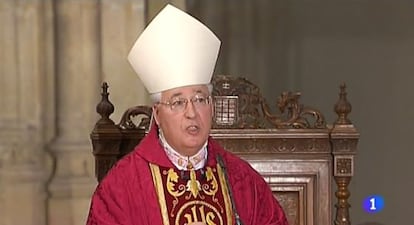Monsignor "dog with a bone"
The bishop of Alcalá de Henares upset many with his Good Friday homily In it, he openly criticized homosexuality, dividing his congregation in the process

Good Friday and Corpus Christi are two of the most significant Church holidays. On these occasions, a bishop displays all of his magnificence and tests his own moral leadership as well as his capacity for conciliation among the members of his diocese.
In the two months between both feast days, Monsignor Juan Antonio Reig Pla, the bishop of Alcalá de Henares, has achieved the exact opposite of that: he has angered, divided and created confrontation among his flock. A different man would try to calm things down. But not Reig Pla. They don't call him "Monsignor dog with a bone" for nothing.
In his Good Friday homily at Alcalá cathedral, which was followed by millions of spectators on the state broadcaster TVE, the bishop stated that homosexuals "sometimes become corrupt and prostitute themselves; they go to men's clubs and find hell there." With his words, Reig Pla offended many residents of Alcalá, a quiet town with a population of 200,000 located 30 kilometers from Madrid, and famous until now for its university, hosting the Cervantes Award and having a historical quarter that's a Unesco World Heritage Site.
Exasperation reached such a level that the city council approved a motion vetoing the bishop from municipal acts and requesting he be removed from his post. The initiative was supported by the Socialists (nine councilors), United Left (three) and the centrist UPyD (two), while the ruling Popular Party (12 councilors) and the extreme rightwing group Alcalá 2000 (one) voted against it.
Apparently shocked at seeing his sacred teachings contested, Monsignor went on the offensive. After issuing a statement to the effect that "no human institution is legitimized to judge or prevent the Catholic doctrine from being taught" and asking all Catholics to pray for religious freedom in Spain, for himself and those who are "persecuting" him, Reig Pla embarked on a campaign of self-reaffirmation. In May, the nine-year-olds who had their First Communion and their guests were asked by Reig Pla to send emails to City Hall asking the councilors who supported the motion against him to please withdraw it.
That was on May 23. Three days later, flushed with success after being ardently defended by the head of the Spanish bishops, Cardinal Rouco Varela, receiving an alleged 2,000 messages of support and walking into a 10-minute standing ovation at the World Family Congress in Madrid, Reig Pla expanded his list of sinners. This time he made reference to those who support assisted reproduction, radical feminism, embryo manipulation and gender ideology. According to him, these options "deconstruct the family, education and the person."
There are more than 70 bishops in Spain, and none is offensive as he is"
A bishop is supposed to be Christ's ambassador on earth, but diplomacy does not appear to be one of Reig Pla's strong points.
It is not even necessary to walk out of the 19th-century building that houses Alcalá City Hall to find several people who feel personally offended by His Eminence. Pilar Fernández, head of United Left, admits she is deeply hurt.
"If it were up to me, my son would never set foot in church in his entire life. I feel deeply offended because my child is the future. To deny women the right to motherhood that science affords them is like denying treatment to a cancer patient," says the 42-year-old, who had her baby through assisted reproduction 18 months ago. "It was two years of sweat and tears to bring a life into this world."
It was Fernández who came up with the nickname Monsignor Erre que Erre, because she says he is like the unconscionably stubborn main character in the old comedy movie Don Erre que Erre. "If he'd made any kind of gesture after the homily, it wouldn't have come to this. But no. He is in possession of the truth, his kingdom is not of this world, and this city does not deserve such a bishop. Let's hope he achieves what he seems to be after, to be made cardinal, and then it's off to Rome."
Javier Rodríguez Palacios, 37, head of the opposition Socialists in the city council, also feels offended. In 2010, a year after becoming bishop of Alcalá, Monsignor Reig declared: "Canonically constituted marriages are less given to gender violence than unmarried couples."
Rodríguez, who has been living with his girlfriend Diana for six years, says these words were the last straw.
"To those who recriminate us for voicing our opinion about the bishop, my reply is that it's the bishop who keeps meddling in our affairs; he's the one who criticizes and vilifies what the rest of us do and what we don't do, whether we are Catholic or not. Of course he is expressing the doctrine of the Church. But there are more than 70 bishops in Spain, and none is as offensive as he is. I think he is building himself a political career. He sees himself as the spokesman of the radicals [...] I think that's fine, but we don't want this bishop in Alcalá."
Not everyone agrees. "My minister is a holy man who loves the poor and does not deserve this persecution by ill-intentioned people who take his words out of context," says the director of a non-profit group who would rather remain anonymous.
Cardinal Rouco, who will be 76 in August, is thinking of retirement and there are those who believe that Reig Pla is moving himself into the frame. But an insider in bishop circles says that "strategy is too big a word for Reig. He is just a useful pawn for Rouco; his barking dog. What he says is what nearly all bishops think, even if a few are shocked to hear it. But he lets it all out, swollen with Catholic pride, and he views the consequences as a personal martyrdom. He is probably perplexed by all the ruckus, and really does believe that he is being persecuted. Victimism is always useful to the Church."
Tu suscripción se está usando en otro dispositivo
¿Quieres añadir otro usuario a tu suscripción?
Si continúas leyendo en este dispositivo, no se podrá leer en el otro.
FlechaTu suscripción se está usando en otro dispositivo y solo puedes acceder a EL PAÍS desde un dispositivo a la vez.
Si quieres compartir tu cuenta, cambia tu suscripción a la modalidad Premium, así podrás añadir otro usuario. Cada uno accederá con su propia cuenta de email, lo que os permitirá personalizar vuestra experiencia en EL PAÍS.
¿Tienes una suscripción de empresa? Accede aquí para contratar más cuentas.
En el caso de no saber quién está usando tu cuenta, te recomendamos cambiar tu contraseña aquí.
Si decides continuar compartiendo tu cuenta, este mensaje se mostrará en tu dispositivo y en el de la otra persona que está usando tu cuenta de forma indefinida, afectando a tu experiencia de lectura. Puedes consultar aquí los términos y condiciones de la suscripción digital.









































